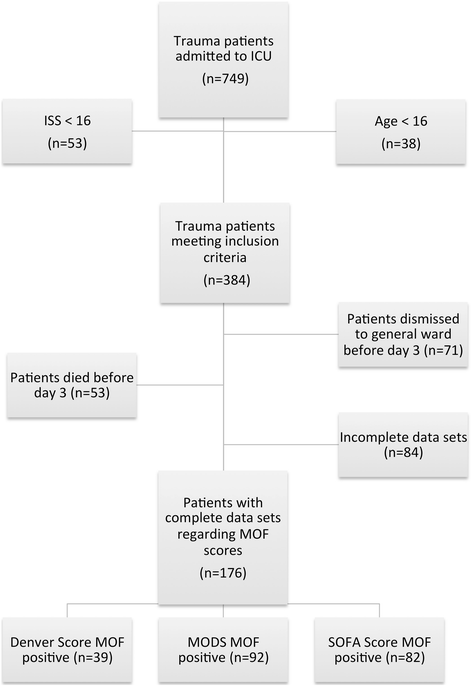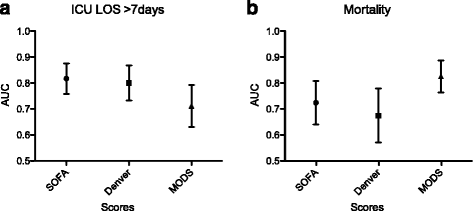Which score should be used for posttraumatic multiple organ failure? - Comparison of the MODS, Denver- and SOFA- Scores
- PMID: 27809885
- PMCID: PMC5094147
- DOI: 10.1186/s13049-016-0321-5
Which score should be used for posttraumatic multiple organ failure? - Comparison of the MODS, Denver- and SOFA- Scores
Abstract
Background: Multiple organ dysfunction and multiple organ failure (MOF) is still a major complication and challenge in the treatment of severely injured patients. The incidence varies decisively in current studies, which complicates the comparability regarding risk factors, treatment recommendations and patients' outcome. Therefore, we analysed how the currently used scoring systems, the MODS, Denver- and SOFA Score, influence the definition and compared the scores' predictive ability.
Methods: Out of datasets of severely injured patients (ISS ≥ 16, Age ≥ 16) staying more tha 48 h on the ICU, the scores were calculated, respectively. The scores' predictive ability on day three after trauma for resource requiring measurements and patient specific outcomes were compared using receiver-operating characteristics.
Results: One hundred seventy-six patients with a mean ISS 28 ± 13 could be included. MODS and SOFA score defined the incidence of MOF consistently (46.5 % vs. 52.3 %), while the Denver score defined MOF in 22.2 %. The MODS outperformed Denver- and SOFA score in predicting mortality (area under the curve/AUC: 0.83 vs. 0.67 vs. 0.72), but was inferior predicting the length of stay (AUC 0.71 vs.0.80 vs.0.82) and a prolonged time on mechanical ventilation (AUC 0.75 vs. 0.81 vs. 0.84). MODS and SOFA score were comparably sensitive and the Denver score more specific in all analyses.
Conclusions: All three scores have a comparable ability to predict the outcome in trauma patients including patients with severe traumatic brain injury (TBI). Either score could be favored depending weather a higher sensitivity or specificity is targeted. The SOFA score showed the most balanced relation of sensitivity and specificity. The incidence of posttraumatic MOF relies decisively on the score applied. Therefore harmonizing the competing scores and definitions is desirable.
Keywords: Denver Score; Multiple organ dysfunction; Multiple organ failure; Sofa score; Trauma.
Figures
References
-
- Minei JP, Cuschieri J, Sperry J, Moore EE, West MA, Harbrecht BG, O’Keefe GE, Cohen MJ, Moldawer LL, Tompkins RG, et al. The changing pattern and implications of multiple organ failure after blunt injury with hemorrhagic shock. Crit Care Med. 2012;40(4):1129–35. doi: 10.1097/CCM.0b013e3182376e9f. - DOI - PMC - PubMed
-
- Frohlich M, Lefering R, Probst C, Paffrath T, Schneider MM, Maegele M, Sakka SG, Bouillon B, Wafaisade A, Committee on Emergency Medicine IC et al. Epidemiology and risk factors of multiple-organ failure after multiple trauma: an analysis of 31,154 patients from the TraumaRegister DGU. J Trauma Acute Care Surg. 2014;76(4):921–7. doi: 10.1097/TA.0000000000000199. - DOI - PubMed
Publication types
MeSH terms
LinkOut - more resources
Full Text Sources
Other Literature Sources
Medical



